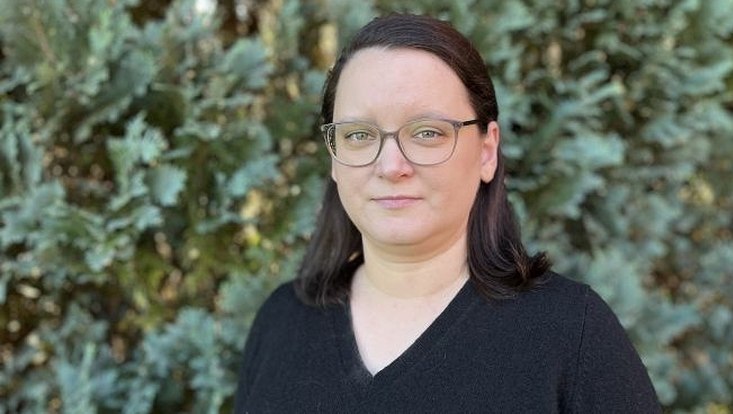Julia Klar, M.A.

Curriculum
Julia Klar studied German language and literature, English studies, and German-language literatures at the University of Hamburg. Since 2023, she has been working on a dissertation thesis on the forms of climate change in texts by Marion Poschmann, Esther Kinsky, Anja Kampmann, and Judith Schalansky [working title: Clouds, Plants, Fossils: Forms of Climate Change in Contemporary Literature].
Research project: Forms of Climate Change in Contemporary Literature
The project takes as its starting point the frequently voiced objection to an ecocriticism that is too strongly focused on themes and content, in order to investigate the forms of climate change in texts by Marion Poschmann, Esther Kinsky, Anja Kampmann, and Judith Schalansky. Caroline Levine's broad concept of form comes into play, according to which forms not only have ordering and organizing powers within a text, but also fulfill this function equally well in socio-political contexts, i.e., extra-textually. This makes forms comparable with each other on all levels in the sense of a flat ontology and enables the premise of the project: to understand natural phenomena, ultimately climate change itself, as interacting and colliding forms as well.
In the context of the Fellowship, the fossil in particular, which in its manifestations - as fossil remains of extinct creatures from geological deep time or as fossil fuels - configures the intersection of multiple climate change discourses, will be considered as a form. It is to be asked how the form of the fossil exerts its ordering powers in the texts, but also, especially, how texts of different genres - poetry, novels, essays - resist these powers by confronting them with poetological reflections on form.
Research results: Forms of Climate Change in Contemporary Literature
During my Junior Fellowship in the DFG Centre for Advanced Studies “Imaginaria of Force”, I focused on the literary representation of fossil and post-fossil energy landscapes in contemporary literature, particularly in the works of Anja Kampmann, Marion Poschmann and Esther Kinsky. These texts offer concise approaches to the representation of landscapes characterized by historical and contemporary forms of energy and reflect in different ways the transitions from fossil to post-fossil energy cultures. I was able to develop some of the results into a contribution for the Warburg-Kolleg “Energy Landscapes”, which problematizes the literary examination of energy landscapes and the underlying clash of scales, which is considered one of the central challenges to the representation of climate change.
I also focused on the concept of terrain ("Gelände") in the works of Esther Kinsky. Kinsky's representation of terrain as a semiotic construct, which she prefers to the concept of nature or landscape, is an essential addition to my project, as it makes the transformation of landscape legible as historical and cultural stratifications. In the context of energy landscapes, this concept of terrain is revealed as a literary reflection on the connection between nature, culture and energy, which Kinsky addresses in various genres (essay, poems, novels).
Thanks to the multifaceted discussions and the interdisciplinary orientation of the CAS, I was able to refine the methodology of my project on the forms of climate change and gain new impulses for the analysis of literary forms and their epistemic dimensions. This time enabled me to consider the concept of energy landscapes not only as a thematic element, but also as a structural form in contemporary literature and thus to formulate further questions for my dissertation.
